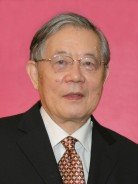

Tsinghua University has a great deal to be proud of in Zhou Guangzhao who, as a prominent Physicist and President of the Academy of Sciences, has given his best to scholarship and to the promotion of science and technology in China. After working as a researcher and an academic at the Dubna Joint Institute for Nuclear Research in Moscow and Beijing University respectively, Zhou launched himself into full time research in 1979 at the Institute of Theoretical Physics in the Academy of Sciences, at a time when China’s Open Door Policy provided him with opportunities to visit major laboratories in the USA and Switzerland.
Zhou Guangzhao is an outstanding theoretical Physicist, having contributed to three of the most important fields of Physics, namely High Energy Physics, Nuclear Physics and Solid State Physics. In elementary particle physics, he calculated in a simple and concise way then partial conservation of axial current (PCAC) which provided a significant impetus for work in weak interaction theory. In analysis high energy scattering amplitudes, Zhou was the first to introduce the concept of helicity amplitude. In the realm of nuclear physics, he contributed to the theoretical design of China’s atomic and hydrogen bombs by doing pioneering work in detonation theory, implosion dynamics and computational physics. As Head of the Academy of Sciences, Professor Zhou has in recent years provided leadership for a team of dynamic young scientists to research on High Energy Physics. Findings on Grand Unification Theory, Coset Gauge Theory and the topological aspects of Quantum Field Theory have attracted attention internationally.
As President of the Academy of Sciences since 1987, Zhou Guangzhao believes that science and technology should contribute to the development of China’s economy. Thus through research and development, Chinese scientists must aim to innovate and be independent so as to maintain high standards in inventions, design, materials and production, and to be competitive in capital and resource accumulation and in technology advancement. He believes that the development of science and technology requires a good environment and certain conditions. These include a stable political scene, adequate financial resources, a democratic academic atmosphere, encouragement of thorough investigations and dynamic international collaborations.
Under his direction, the policy of: "One Academy, Two Systems" aspires to put China in the forefront of scientific research. The two systems refer to pure research and applied research for economic production. Our chief scientist is proud of China’s success in making strategic breakthroughs by being selective in research goals. Achievements in the synthesis of bovine insulin, yeast alanine transfer RNA, hybrid rice and the positron-electron collider are all world renowned. The Academy promotes interdisciplinary research, such as electronic and optical sciences, and welcomes scientists to undertake individual and collaborative research in its eighty laboratories. Professor Zhou has also set up on behalf of the Academy, computer, agricultural and scientific enterprises all over the nation, and encourages research fellows to seek support for major projects from the private sector. Recognition of our theoretical Physicist includes two honorary degrees from the City College of the City University of New York and the Chinese University of Hong Kong as well as Memberships and Fellowships of six scientific academies and institutes from over six countries. Mr Chancellor, for his scholarship and achievements, I request you to confer on Zhou Guangzhao the Degree of Doctor of Science honoris causa and in absentia.
Citation written and delivered by Professor Lee Ngok, the Public Orator.



